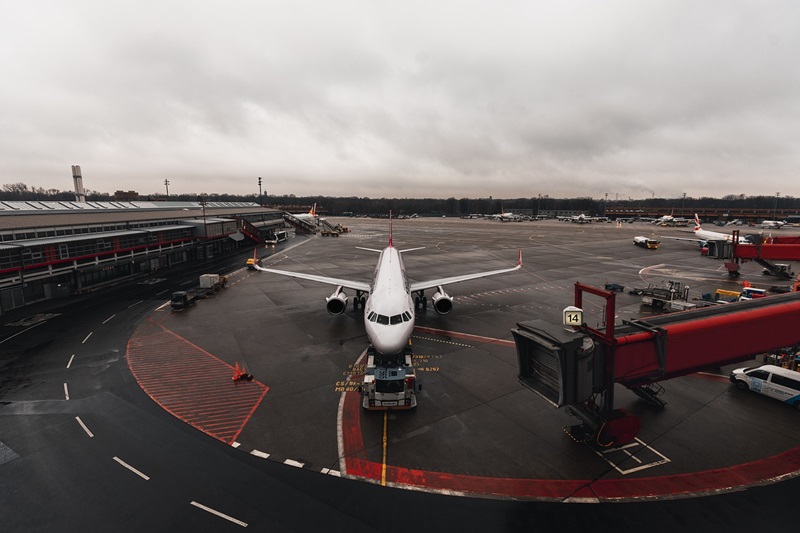While weather forecasts are useful for anyone, some industries rely on accurate weather forecasting for risk management, resource allocation, and customer safety.
Weather-dependent industries require favorable conditions in which to work outside or to protect their supply chain. For them, weather is a crucial decision-making factor.

What Makes Certain Industries Dependent on Weather Conditions?
Bad weather is not a real concern for those who work inside, but severe weather conditions can lead to product damage or even lawsuits for certain businesses.
Unfavorable weather conditions can make it impossible to carry out essential elements of business operations, such as completing flights in the aviation industry, while extreme temperatures may require work stoppages to protect human health, like in the tourism industry. Seasonal outlooks and long range forecasts may affect how a business plans its on and off season, or it may impact product output, such as for agricultural operations.
Accurate weather intelligence is a must for many industries, as it will play a significant role in whether they are able to deliver quality results and ensure customer satisfaction.
Weather-Dependent Industry Types
Certain industries require highly accurate weather forecasts in order to perform their work safely. They can also rely on historical weather data to develop contingency plans and organize their work around the risks of extreme weather conditions.
While many industries are affected by weather conditions, these are some of the most weather-dependent economic sectors.
Construction
Weather affects construction companies in several different ways. Firstly, workers are only legally allowed to work within a certain temperature range. OSHA recommends that workers only be expected to work in conditions up to 78°F (25 °C).
High humidity can also lead to work stoppages. With advance notice and real-time updates, companies can ensure that they are able to keep working while prioritizing safety.
As construction often involves explosives, they must be aware of whether conditions are dry enough for detonation to work or whether the air temperature may cause spontaneous combustion.
Accurate forecasts enable a construction crew to avoid hazardous weather patterns, orchestrate projects around weather conditions, and maintain productivity even in poor weather.
Agriculture
The global economy relies on agriculture, whether that is food for livestock or specialty products like wine. This is one of the most weather-dependent industries, severely impacted by climate change, which has led to crop failures all over the world.
Nearly every possible weather event will impact agriculture, whether that is high heat, flooding, or severe wind storms. Weather forecasts help keep farmers abreast of any conditions that may harm their crops at any stage of the life cycle, whether that is a deluge that will wash away seedlings or high winds that will break shoots.
Historical weather data benefits farmers by helping them determine the right time to plant specific crops based on their preferred temperature and humidity conditions. Farmer weather data can also alert for storms or hail so that they can take steps to protect crops and the surrounding property from damage.
Energy
Weather impacts user behavior, something that’s critical to know for energy companies. For example, customers require more energy during heat waves, and if the electric grid isn’t prepared for this, it may cause a blackout.
Energy systems are pushed to their limit during a natural disaster, which causes major damage to infrastructure and may cause a total shutdown of the system. Being aware of impending severe weather, electrical companies can prepare by prioritizing the protection of specific areas of the electric grid, such as hospitals and other emergency services.
They can also request support from electrical companies in other areas of the country so that they can bring residences and businesses back online as soon as possible. Weather forecasts are a critical element in orchestrating emergency responses, determining when it’s safe to perform necessary maintenance on systems, and protecting the national grid as a whole.
Retail
There are several reasons why retail sectors are weather-dependent industries. Firstly, nearly every sector of the industry relies on the transportation of goods, whether that is raw materials or finished products for sale.
Weather forecasting helps stores ensure that they are prepared for longer transit times during a winter storm or heavy rain when planes or trucks might be delayed while waiting for safer weather. On a smaller scale, weather data about wind storms and rain can help smaller tourist shops know when to bring in outside displays so that they don’t lose critical stock.
The retail industry is also impacted by customer behavior. People shop differently during different seasons and weather conditions, so historical weather data and current forecasts provide valuable data for how to stock and organize stores.
Sports
Weather can pose severe risks to sportspeople and spectators, particularly during the summer. Heat stroke due to high heat and humidity is a common malady affecting athletes at all levels, and weather data can help planners prepare by either canceling events, moving them to later in the day, or simply ensuring that everyone is adequately hydrated.
For winter sports, heavy snowfall or dangerously low temperatures can require cancelations or additional safety measures for everyone involved. An accurate weather forecast ensures businesses can keep their players and customers warm.
Lastly, severe weather events like storms and hurricanes must be factored in, as they present serious risks to the health and safety of everyone in the area. Closing stadiums, transporting employees away from the area, and securing equipment in advance is only possible with real-time weather alerts.
Advantages of Mobile Apps for Weather-Dependent Industries
Many different industries rely on good weather forecasting, but not all of them need the same features. Additionally, weather-dependent companies may work across a large service area, where weather conditions will differ from place to place.
A mobile app ensures weather data is perfectly matched to the given location, developing a fluid decision-making process that reduces work stoppages without endangering stakeholders.
Accurate Real-Time Weather Data
Real-time weather data helps companies in weather-affected industries make good day-to-day decisions based on predictions of events. This is particularly important during severe weather, as users can get near-instantaneous reporting of weather events as they unfold.
This process combines current weather observations with historical records to show what you can expect in a typical day or week. You will receive the latest up-to-date weather records, as well as a roadmap of what can be expected throughout the rest of the day and week based on several decades of historical data.
Location-Based Services
Companies in certain industries, such as electrical operations, cannot simply stop work because of adverse weather, but they can mitigate risks to their employees by tracking severe weather as it unfolds. Location-based services let companies move employees out of the way of danger or direct them to the places where they are needed most, all based on the most specific location-based report possible.
Notifications and Alerts of Extreme Weather Events
Advanced warnings of dangerous weather can make the difference between life and death in many instances. Weather alerts provide immediate push notifications when there are developing signs of a dangerous weather event, such as thunderstorms, flooding, or hurricanes, so that companies can keep their workers out of harm’s way and implement their emergency preparedness plans.
Integration With Industry Services
Different industries use different services, whether that is real-time reporting of traffic conditions, inventory tools, or scheduling apps. A mobile weather app can be seamlessly integrated with these products to provide employees with a comprehensive look at the workflow. It ensures that everyone is on the same page, and that there is no need to scroll through hundreds of different apps simply to find what you need.
Important API Features for Industries
To enjoy all the benefits of good weather forecasting, businesses require a reliable weather API that has all the industry-specific features they need.
Geolocation
Geolocation is often very helpful for the tourism and retail industries, as they will be able to sell more effectively. For example, if it’s raining in a customer’s location, your shopping app can prioritize rain boots, coats, umbrellas, or indoor activities.
For example, if the first day of frost typically comes on a certain day each year, stores will be able to stock winter clothing a little ahead of time so that people can prepare. They can also move weather-related gear, like gloves or umbrellas, to more prominent areas of the physical or online shop when they are most likely to be purchased.
Statistical and Historical Forecast
While there is no guarantee the weather forecast will be perfectly accurate, statistical forecasts give businesses data-driven, tangible information about average weather conditions on a certain date, providing a more short-term forecast.
On the other hand, historical weather data aggregates decades of data to provide information about extremes and normals for a given date. It is another approach to weather patterns that helps businesses plan events further into the future.
Having both provides businesses with enough information to make decisions about their workflow, transit schedules, or inventory and adapt to climate change. For example, if it’s well-known that a certain date has dangerously high temperatures, construction foremen can plan to work earlier in the day, schedule shorter shifts, or provide their employees with protective equipment so that they are at a lower risk of heatstroke.
Multiple Data Sets
Just knowing the temperature is not enough for businesses in many industries, which is why an API needs to have robust weather data from several categories.
Whether this is information about wind speed and solar irradiation for renewable energy farms, or details about historical forecasts to plan out training schedules for sports teams, having the right tools will make a major difference in your company’s success. Look for an API that has things like wind speed, solar energy, precipitation, and soil temperature.
Where to Get Accurate Weather Forecast Data
A weather forecast API can make all the difference in the success of a company, particularly in industries most affected by severe weather. Robust, accurate, and customizable weather APIs help companies make good decisions about their workflows and resource allocation, ensuring their customers and employees are safe and that downtime is kept to a minimum.
